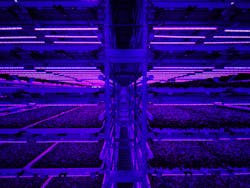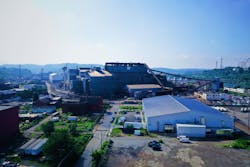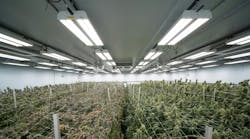No sooner had both Signify and ams Osram noted slowdowns in the all-important horticultural LED lighting segment than an example came from Pittsburgh, where the once-promising Fifth Season vertical farm has shut its doors.
Fifth Season, which was known for its robotic operations and towering racks of greens adjacent to a steel mill, had been raising the likes of spinach, romaine lettuce, and mustard kale under 27,000 LED Arize fixtures from GE Current.
Perhaps those lights can find another home, because the press in Pittsburgh has reported that Fifth Season has ceased operations, which means the company has also scotched plans to build another facility in Columbus, Ohio. The website AFN (formerly AgFunderNews) reported the news last month, crediting the Pittsburgh Business Times (subscription required) with breaking the story.
AFN cited the high capital expenditures — which would include lighting — as well as the difficult macroeconomic environment in explaining the the shutdown. A shortfall might have been in the making in April, when we noted in our earlier article that Fifth Season would not provide us with exact yield numbers, which, while growing, seemed to be below their target.
Those reasons mesh with recent reports from the CEOs of both Signify and ams Osram that indoor growers are finding it difficult to afford LED lights given the budgetary constraints brought on by current inflationary and economic pressures.
The slowdown affects the greenhouse sector — which relies on natural and artificial light for supplementation — as well as vertical farms, which rely exclusively on electric light.
Ironically, while LEDs can help growers save significantly on energy costs, the prohibitive cost of energy in many regions of the world is keeping those lights financially out of reach.
“In the horticulture market, the adoption is expected to see some delays, simply due to higher energy costs,” ams Osram outgoing chief financial officer Ingo Bank told analysts during the company’s third-quarter results phone call.
Bank’s remarks echoed those of Signify CEO Eric Rondolat a few days earlier.
“Our horticultural business is temporarily affected by the price of energy,” Rondolat said on Signify’s third-quarter analysts’ call. “Growers these days are having their P&L pretty much pressured by the higher price of gas and electricity.”
Austin, Texas–based Fluence, a division of Signify, has noticed similar developments. “Supply chain shortages continue to drive up capital improvement costs, cannabis surplus in the U.S. is forcing retailers to sell their products at deep discounts, and inflation hangs over consumers worldwide,” Fluence CEO David Cohen noted in his introduction to the State of the Cannabis Lighting Market 2022 report in October. “It’s tough out there.”
Even the cannabis trade, widely regarded as a key driver of horticultural lighting, could be at least temporarily slowing, given the surplus that Cohen mentioned, and other rough-and-tumble aspects of the market.
Lafayette, Colo.–based food and cannabis grower urban-gro Inc. recently reported a revenue decline that it attributed not to the food sector, but to “significantly reduced equipment demand in the U.S. cannabis market as a result of ongoing state-level regulatory delays in the license-awarding process, as well as the lack of movement on passing key industry financial support models such as the SAFE Banking Act.”
Still, industry executives remain optimistic for the long term, given the world’s need for food, the many benefits of LED including not only energy but also spectral optimization, and the generally liberalizing views toward cannabis use.
Urban-gro CEO Bradley Nattrass last month expressed a vision in which underused indoor parking garages could be transformed into vertical farms.
Urban-gro is a customer of Fluence, where CEO Cohen and his crew are confident.
“Growers — like their plants — are tough,” the company stated in October’s cannabis market report, which noted a steady rise in LED use over the preceding 12 months (a rise which currently looks suppressed). “By adapting to change, the industry (as a whole) has been strengthened by the storm, while advances in both research and technology have allowed for phenomenal growth each year despite hardships.”
However, not all of the “tough” growers are surviving. Like Fifth Season, Paris-based vertical farm Agricool closed last spring.
In what could be regarded as consolidation in the horticultural lighting business, London-based Midstream Lighting acquired Cardiff, Wales–based Hyperion Lighting in September.
A prolonged slowdown in horticultural lighting would be a tough blow to the LED industry, as horticulture has been a priority growth sector.
MARK HALPER is a contributing editor for LEDs Magazine, and an energy, technology, and business journalist ([email protected]).
For up-to-the-minute LED and SSL updates, follow us on Twitter. You’ll find curated content and commentary, as well as information on industry events, webcasts, and surveys on our LinkedIn page and our Facebook page.







